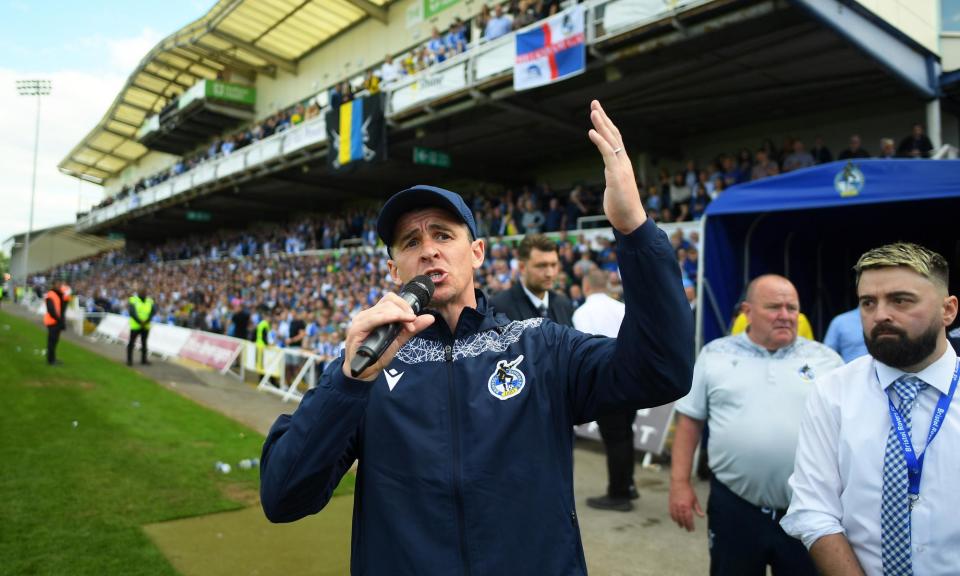Joey Barton’s far-right rebrand points to sad malaise among football’s lost boys

First they ignore you. Then they laugh at you. Then they fight you. Then you win. Then, several years after you’ve won, a former Queens Park Rangers midfielder inexplicably tries to fight you again in an attempt to promote his podcast. Like a catchy maxim ripped from the pages of the philosophy books that he has almost certainly only skim-read, the tale of Joey Barton can be interpreted pretty much however you want.
Perhaps the first reaction to the former Rangers substitute’s latest wave of attention-seeking is also the most natural: ignore, starve of oxygen, move on. Partly this is because his motivations for railing against female pundits in men’s football are so cynically transparent.
Related: Women’s football must be wary of following men’s game into financial cesspit | Jonathan Liew
Why engage on the merest rational level with someone operating entirely outside the bounds of reason? This is, in many ways, the rhetorical equivalent of Barton’s dismissal for QPR against Manchester City on the final day of the 2011-12 season: a blur of unfocused, indiscriminate anger, a last desperate attempt to drag someone else down into the filth with him before he disappears down the tunnel and into oblivion.
Of course, this goes far deeper than one 41‑year‑old former Bristol Rovers manager (win ratio 37.1%) and his crumpled onanistic desire to feel something again. Not least because of the way he has broadened out his generic criticism to specific broadcasters, who have then had to face the wrath of his 2.7 million social media followers. And not least because of the additional emotional labour that many women in football have felt obliged to perform in the days since: defending their positions, defending their colleagues, defending their right simply to earn a living against a loud lunatic fringe with seemingly inexhaustible reserves of time, self-hatred and burner accounts.
Enough now. This is a male problem, and to be quite honest men have been shirking the hard work on this for far too long. And it is very specifically a football problem, even if, in his shameless grift, the 11-minute one-cap wonder is clearly channelling the same far-right talking points as more seasoned online contrarians such as Andrew Tate and Russell Brand and that Tory MP with the Rick Parfitt wig whose name I always forget.
Since its earliest days football has always been a Petri dish of bruised and broken masculinity, conceived from first principles as a place where men gather to perform and prove themselves. Where the constraints and compromises of wider society did not apply. Where – from the terrace ruck to the Premier League sex party – overt masculinity has always been rewarded rather than reined in. And though the sport is more diverse than it has ever been, a safer space for women than it has ever been, that culture persists; perhaps not so much in the glass-flecked alleyway but in the fan forum, the newspaper comments section, the sternly worded legal injunction protecting the identity of the latest footballer accused of sexual violence.
For the ex-footballer, flung unceremoniously from the carousel, now on the outside looking in, the values and certainties that helped them to thrive in this world now offer precious little protection. Perhaps this is why so many former footballers find themselves vulnerable to financial scams or conspiracy theories, convinced that the same special essence that slipped them free of the chains of society can help them do so again.
How does Matt Le Tissier end up sharing bizarre and antisemitic 9/11 conspiracies? Why does Iker Casillas think the moon landings were faked? How does Rickie Lambert end up going on marches against the “15-minute city” and sharing something called the “Great Awakening Theory”? How does Barton become a champion of the disgraced “alt-right” fantasist Alex Jones?
Very little of the actual content is worth addressing in any kind of detail, but there is a common worldview at work here: not coherent by any stretch but devastatingly clear in its emotional impetus, its determination to see darkened enemies everywhere. The world is not what we were told it was. We were all lied to. And I – the disaffected middle-aged man, society’s last permissible victim – am the last hope against the total collapse of humanity.
Related: Discrimination against women working in English football on rise, survey says
Why would Barton try to rebrand himself in the cloaks of mainstream far-right populism? Perhaps the more operative question is: why wouldn’t he? This is a man whose lust for controversy and attention has been indulged and encouraged at every turn: often by a largely middle-class media for whom the ability to quote fortune-cookie fragments of Nietzsche or Viktor Frankl was interpreted as some kind of noble redemption arc.
Remember the concerted attempts around a decade ago to reposition this convicted criminal as some kind of misunderstood urchin intellectual? The book deal, the simpering coverage, the romanticisation of his violent past, the Question Time invitation. “If I’m somewhere and there’s four really ugly girls, I’m thinking: ‘She’s not the worst,’” he told a Ukip politician on the programme. Who could possibly have seen this bright young man becoming a rent‑a‑misogynist on Elon Musk’s platform?
So, yes: by all means ignore Barton if you must. If that’s what helps you get through the day. But by the same token something really quite sinister is happening here, a gathering movement of disaffected young men emboldened by our current political moment, of which Barton is merely an opportunistic symptom.
It begins with a throwaway comment about women on the telly. With an easily muted jibe at the Lionesses. History tells us it never ends that way.

 Yahoo Sport
Yahoo Sport 





































